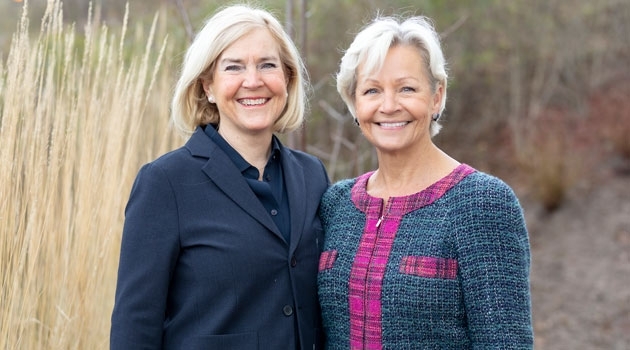Interdisciplinary research on women’s mental health
Mental illness is a growing societal problem and women are particularly vulnerable. An interdisciplinary women’s mental health centre – WoMHeR – has now been established at Uppsala University. The goal is to improve knowledge, with a focus on women of childbearing age.
The rise in mental illness among women is a complex problem that must be explored from various perspectives. There is also a significant public interest, which Uppsala University is meeting with this new initiative, according to Lisa Ekselius. She is a professor of psychiatry at the Department of Neuroscience and director of WomHer. “I believe it’s very meaningful for research to focus on interdisciplinary goals, because the border area between fields is often where things happen and exciting discoveries are made.”
The deputy director is Agneta Skoog Svanberg, professor of reproductive health. She helped launch the initiative with Lisa Ekselius and two colleagues, Inger Sundström Poromaa and Alkistis Skalkidou, at the Department of Women’s and Children’s Health.
Common during childbearing years
Mental illness in women is especially common during the childbearing years, for example in conjunction with assisted fertilization, abortion or childbirth. Women are also overrepresented when it comes to mental illnesses such as anxiety disorders and depressive diseases. In the 2000s, Lisa Ekselius and Agneta Skoog Svanberg worked together on research projects that resulted in several doctoral dissertations.
reproductive health.
They subsequently explored areas beyond medicine to gain both a broader and deeper approach to the issue. In the past two years, they have built a network that currently consists of around 60 senior researchers in different scientific fields. There is significant commitment, concludes Skoog Svanberg. “In our research, and in society in general, we’re seeing a great deal of writing and speaking on mental illness, so this feels particularly timely. A platform like this, where we gather all the information on the subject, will make us more visible.”
Open call for 16 doctoral projects
In the beginning of the year, an open call was announced for 16 doctoral products and the application period ends on 16 February. A group of international researchers will read and assess the applications before a decision is taken in April or May.
They are also planning a symposium at the end of April and a research school that will give the doctoral students an interdisciplinary foundation.
“The University is home to an enormous amount of expertise, but it has never really been gathered in one place, which we have the opportunity to do now,” says Lisa Ekselius.
Agneta Skoog Svanberg adds, “The journey we’ve taken over these years has been incredibly gratifying in that we have understood how much expertise and interest exists in this area. It’s surprised me and it’s been really fun.”
Not just a medical problem
The rise in mental illness in society is not just a medical problem; it can also be studied by linguists, philosophers and historians, among others. Technical research is needed for brain imaging or to develop AI tools that can be used in research processes, for example. It is still too soon to say what specific projects the centre will focus on, but one thing is certain: there will be interdisciplinary projects involving research in at least two disciplinary domains.
“It’s extremely stimulating to gather people of different backgrounds and with different work approaches. Everyone encourages international collaborations, but you should take advantage of the opportunity even within your own university. We have taken a step across disciplinary boundaries now, opening up so much potential,” says Lisa Ekselius.
Annica Hulth
Interdisciplinary research center
WoMHeR – Women's Mental Health during the Reproductive lifespan – is a center focusing on key research issues regarding women’s mental health that was established at Uppsala University in 2019. WoMHeR aims at being a unique, strategically relevant, interdisciplinary research center, with focus on the contemporary global increase in mental health problems, especially among women.

